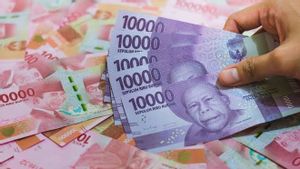Coordinating Minister for Economic Affairs Airlangga Hartarto responded to the recession that will be experienced by the United States (US).
This affected the drop in the Indonesian stock market today.
"Then regarding the US (United States) of course we will continue to monitor it," said Airlangga at his office, Monday, August 5.
Even so, Airlangga admitted that the US recession would trigger the issuance of capital flows from the Indonesian domestic market to the US (capital flight).
Given, the domestic interest rate is still higher than the inflation rate.
"We also know that we must also maintain so that there is no capital flight due to differences in interest rates in Indonesia and in other countries, including the US dollar," he said.
Therefore, he hopes that the interest rate of the Central Bank or the Fed can decrease in the fourth quarter of 2024, although no one guarantees this.
"Because of course if we look at the interest rate rate compared to the gap inflation, it's a bit high," he added.
Meanwhile, the Composite Stock Price Index (JCI) fell 3.40 percent or 248.47 points to 7,059.65 until the end of trading on the Indonesia Stock Exchange (IDX).
Then, the total volume of exchange transactions reached 24.4 billion shares with a transaction value of IDR 13.75 trillion.
A total of 592 stocks fell, 62 stocks rose and 134 stocks were stagnant.
The entire sectoral index has fallen along with the JCI. The energy sector fell 4.94 percent, the raw goods sector fell 4.69 percent, the transportation and logistics sector plunged 4.23 percent, the industrial sector weakened 3.73 percent and the infrastructure sector fell 3.15 percent.
Furthermore, the property and real estate sectors fell 3.05 percent, the technology sector weakened 2.92 percent, the financial sector fell 2.69 percent, the non-primary consumption goods sector fell 2.47 percent, the primary consumption goods sector weakened 1.77 percent and the health sector fell 0.72 percent.
SEE ALSO:
Phintraco Sekuritas analyst Alrich Paskalis Tambolang said the weakening of the JCI was caused by domestic and foreign factors.
Alrich said, in terms of domestic economic conditions, it is relatively solid.
As for the second quarter of 2024, Indonesia's economy grew 5.05 percent (yoy).
Despite the quarter-to-quarter decline, household consumption still grew by 4.93 percent and investment increased to 4.43 percent.
"At this time, the Indonesian economy is still under the assumption of the State Budget in the range of 5 percent. This domestic economic condition maintains the potential for further weakening in the JCI today," he explained to VOI, Monday, August 5.
The English, Chinese, Japanese, Arabic, and French versions are automatically generated by the AI. So there may still be inaccuracies in translating, please always see Indonesian as our main language. (system supported by DigitalSiber.id)
















